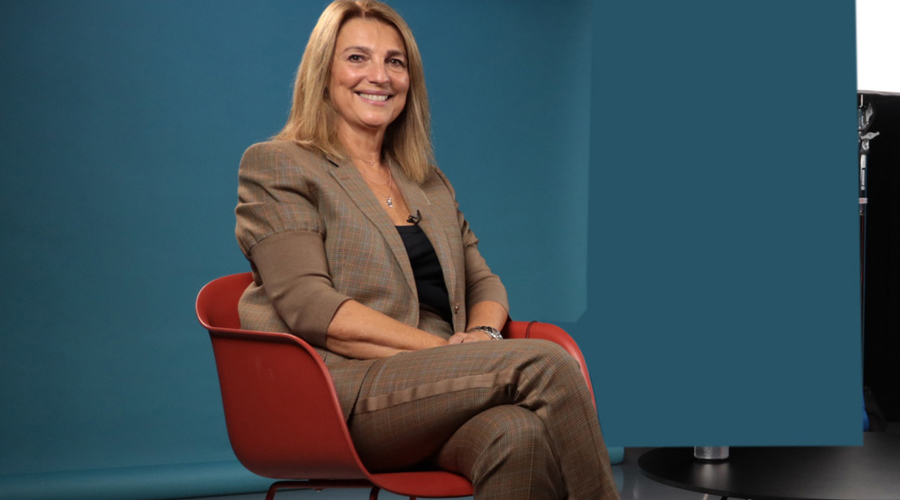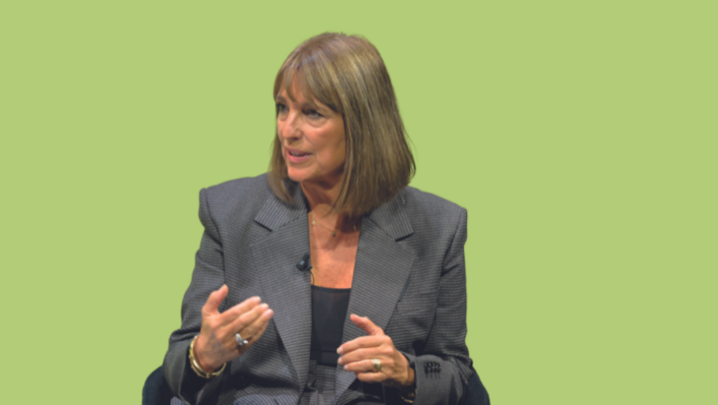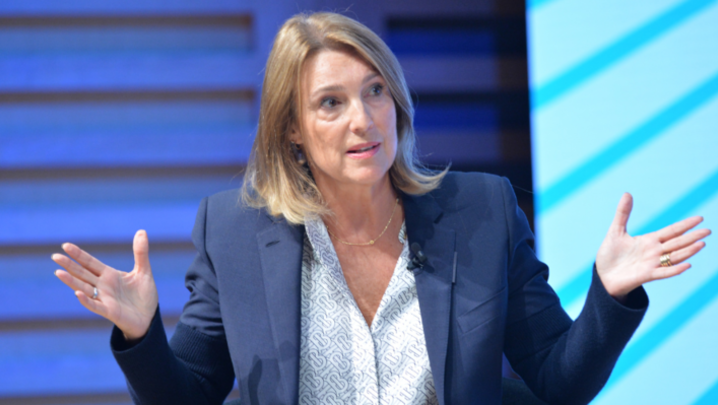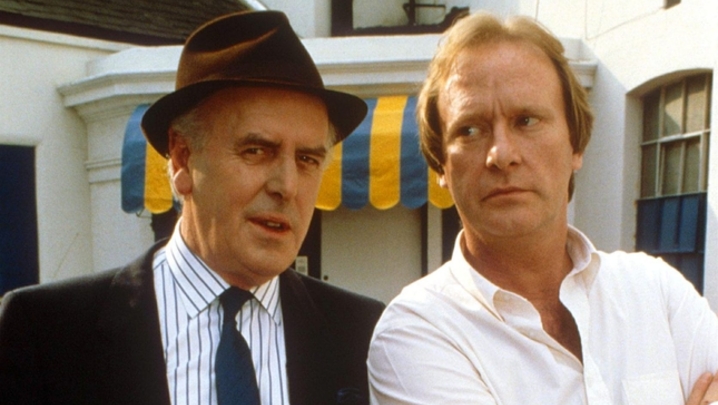ITV Chief Executive Carolyn McCall explains why UK public service broadcasters need prominence on all platforms.
Carolyn McCall offered a robust defence of public service broadcasting during the course of a revealing and wide-ranging interview at the RTS Digital Convention 2020. ITV’s CEO – who was probed by ITV News London and Loose Women presenter Charlene White – also discussed the Black Lives Matter movement, BritBox, ITV’s digital strategy and its response to the coronavirus epidemic.
McCall said that the first Covid-19 lockdown had “brought home to a lot of people” the importance of having “a trusted [TV] source, [with no] disinformation”.
But, she argued, there are many other benefits to the UK’s public service broadcasting ecosystem that the public doesn’t necessarily know about. “Eighty per cent of independent production comes from the public service broadcasters [PSBs], so we keep the creative economy healthy. We spend a huge amount of money out of London. We are required to do that as part of our remit. Most other operators don’t do that; they are very M25-centric.”
And McCall warned: “A lot of the stuff that goes on air would not be made if it wasn’t for the fact that there are PSBs.”
She called for public service broadcasting, which is being reviewed by both media regulator Ofcom and the DCMS, to be treated fairly. After delays caused by the Covid-19 epidemic, both reviews are expected to be published soon: Ofcom’s report is due before the end of the year, while the DCMS is expected to publish by early 2021 at the latest.
“If [a PSB doesn’t] have prominence, its content will not be found in this new digital world with platforms that can exclude you,” said McCall. “If you don’t come to terms with a smart-TV manufacturer, they can just leave you off.
“We spend a lot of money making content [and] we need to see fair value for that. In the linear world, there is a framework for how that operates: you have to have prominence and be on the EPG. But in a title-based world, you can give prominence to the highest bidder and then you won’t find PSB content.”
“It’s a skewed market; it’s not fair or reasonable,” continued McCall. “We have to make returns for our shareholders, so what we need is a level playing field – we’re not asking for special favours.”
McCall claimed that the 2003 Communications Act had reached its sell-by date: “The Act… regulates us highly [and] is not appropriate any more because the whole world has changed – we’re not monopolies or the dominant [broadcasters] any more. There are other dominant players and, if this continues, I don’t think PSBs will exist in the shape they are in today.”
McCall went on to outline a future for ITV that combined the old and the new, but with the latter taking the lead: “We have to be a digitally-led media and entertainment business.
“We’ve got this amazing channel, ITV, which has huge audiences. We want to keep those big audiences and we do that through major-event TV, and I think that has many years to run.
“I don’t think ITV has to change what it’s doing on its mass, simultaneous-reach platform, ITV1.… We’re the only place where you can get those really big audiences, and that’s partly because we do so many family entertainment shows and we do them so well.”
‘We want to do on-demand in a bigger, better way’
But, McCall added: “One of the things we have to do is engage the 16-34s… in a different way, and that [means] being agnostic about where we put our content.
“People under 35, particularly, are watching things on-demand all the time… We want to do on-demand in a bigger, better way. ITV Hub, personalisation, recommendation… and BritBox are very much part of [our] future.”
ITV Hub, she said, “has changed dramatically – we’ve invested a lot in Hub, it’s one of our key priorities”.
One recent success had been true-crime drama Des, starring David Tennant as serial killer Dennis Nilsen. “It has consolidated at around 12 million as a series average, which is unbelievable… 2 million of that 12 million was on ITV Hub. That is a big number – 80% of 16-34s are registered on Hub and 30 million people [in total].”
Did that mean that ITV would start to commission programmes to go straight on the Hub, asked White. McCall replied that ITV’s strategy “has to continue to evolve because everything is changing all the time. Definitely, you will see commissions that are geared to the Hub audience.”
One week after McCall appeared at the RTS Digital Convention, ITV announced a restructuring of its business to reflect the nation’s changing viewing habits. A new Media and Entertainment Division will have two business units, broadcast and on-demand. The latter will include Hub, Hub+ (the ad-free version) and BritBox.
The current director of television, Kevin Lygo, will become MD of the Media and Entertainment Division and will run the broadcast business unit, with chief marketing officer Rufus Radcliffe heading the on-demand side.
McCall, ITV’s CEO since 2018, recalled the devastating impact of the coronavirus lockdown on the broadcaster in March.
“We decided we would test working from home before it became a necessity and so we actually locked down five days earlier. Our IT systems worked seamlessly,” she said. “Most of us thought it would be four to five weeks and we’d all be back in. Most people left their stuff at work. I realised [the situation] was really, really serious when all our productions stopped – we went from about 280 productions worldwide to virtually zero.”
The broadcaster’s focus, said McCall, had been to “conserve our cash and look after our people”. Essentially, this meant getting production up and running again.
“We were still producing 10 hours of live programming, which was a lifeline for people in Britain. I think the value of public service broadcasting, if it was not known by the public, became extremely well known over that period of time,” she emphasised.
At the time, White was on maternity leave. She recalled: “Seeing those daytime shows staying on air made me feel, ‘I think we’re going to be all right.’”
Good Morning Britain and This Morning continued to be made in the studio, demonstrating that television could be produced safely during the epidemic. “We learnt a lot of what we would later implement in terms of our safety protocols from how [to do] it live.” ITV’s daytime programming, said McCall, “was entertaining, informative and reassuring. You can’t get a better description of what public service broadcasting should be about”.
Production has now returned to near-normal. The CEO denied there had been a slowdown in commissioning: “Our programme budget went down this year because we weren’t putting things on air or we couldn’t produce certain shows we had intended to produce – that’s the reason the budget went down. A lot of that is going to go back in next year.
“The only way you can compete is through your content… you have to invest in content.”
She continued: “The advertising market has been hugely impacted by that awful three months of lockdown. The good news is that the advertising market has come back; everyone’s talking about Christmas campaigns.
“We have to continue to be careful about our cash, because the only way to deal with this kind of uncertainty economically is to make sure you’ve got a strong balance sheet.
“[But] the one unassailable fact is that people are going to be watching a lot of content and that’s great for us. We have to keep producing that [with] the quality and engagement that we do.… We need to keep our productions going safely – that’s a priority.”
Covid-19 has not affected ITV’s longer-term plans. “Strategically, it doesn’t change the direction of travel. The fact that we are putting more resources behind what we call on-demand, whether that’s ITV Hub, Hub+ or BritBox… that’s not going to change. Nurturing ITV1? That’s not going to change.”
Report by Matthew Bell. ITV Chief Executive Carolyn McCall was in conversation with Charlene White as part of the RTS Digital Convention 2020, sponsored by YouTube, on 13 October. The producer was Helen Scott.
BritBox hits its milestones
BritBox has ‘done brilliantly in the US and Canada – the international model is a very robust one’, said Carolyn McCall. ‘[A launch in] Australia is imminent and then we’ll start rolling it out from there. The BBC and ITV are totally aligned about that.’
She said BritBox ‘is meeting all its targets but it is a very different product here because we all have our own services, our iPlayers and Hubs, so it’s more tricky, [and there are also] rights issues. It is the go-to place for multi-series box sets with British originated content.’
The return of Spitting Image, released on BritBox last month after an absence of more than two decades, ‘is a big step in making it a very distinctive service. It has had widespread coverage and a lot of subscriber interest.’
She added: ‘If we think [a show] is going to do well on BritBox and in international territories, we can co-produce it with the international division and that obviously brings down the cost for BritBox. Spitting Image is a good example of that because it crosses boundaries very well. I think you’ll see more of that to come.’
BritBox, which was created by the BBC and ITV, also features programmes from Channel 4 and Channel 5. McCall held up the service as ‘a great example of the public service broadcasters coming together’.
She welcomed this ‘collaboration’ but added that, with the BBC, ‘there’ll always be competitive tension and I think that’s good and healthy – it keeps the creative output [in the UK] very high’.
Black Lives Matter at ITV
Carolyn McCall talked about ITV’s much-praised anti-racist advertisement published in response to the Black Lives Matter routine performed by dance troupe Diversity on Britain’s Got Talent in early September.
Ofcom received some 24,500 complaints about the routine, but ITV stood by the show. ‘Within seconds of people seeing the ad, I had so many emails and text messages from people internally, from every part of the company,’ she recalled.
McCall discussed ITV’s efforts to improve diversity within the company: ‘We realised that all the actions we’d taken – and we’d done some really good stuff – had not really gone into something substantive enough… I think it was partly because we were doing it incrementally.’
The broadcaster launched its Diversity Acceleration Plan in July to promote inclusion on-screen and across ITV. The following month, it promoted Ade Rawcliffe to group director of diversity and inclusion.
McCall said the broadcaster was committed to ‘making change at every level in the organisation. That’s why we’ve created jobs in middle management, we’ve doubled our apprentice scheme and we’ve put a director of diversity and inclusion on the Management Board.’
For more on ITV’s Diversity Acceleration Plan see the interview with Ade Rawcliffe.






